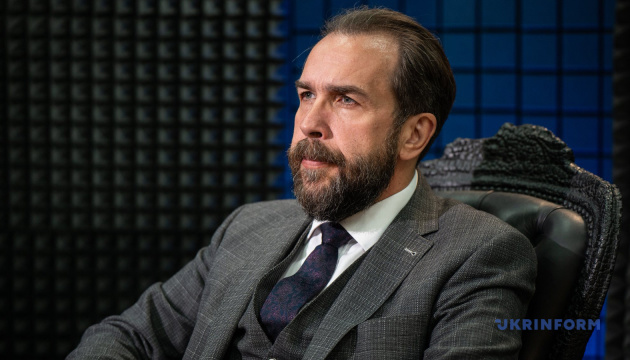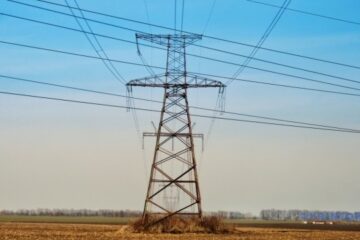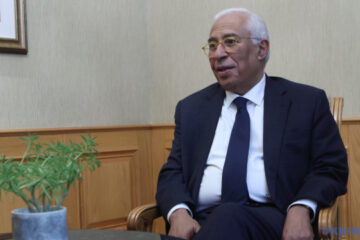Shortly after the farewell visit to Ukraine of Polish President Andrzej Duda, Ukrinform sat down the Charge d’Affaires a.i. of Poland in Ukraine Piotr Lukasiewicz. It has been eight months since our last conversation, so it was interesting to hear from the head of the Polish embassy about the dynamics of bilateral relations in rather turbulent times, his observations on the progress in resolving complex historical issues between the two neighboring countries.
We also heard interesting news about the prospects for defense cooperation, plans for the reconstruction of Ukraine, the fight against Russian disinformation, situation of displaced Ukrainians, and the possible development of regional cooperation formats.
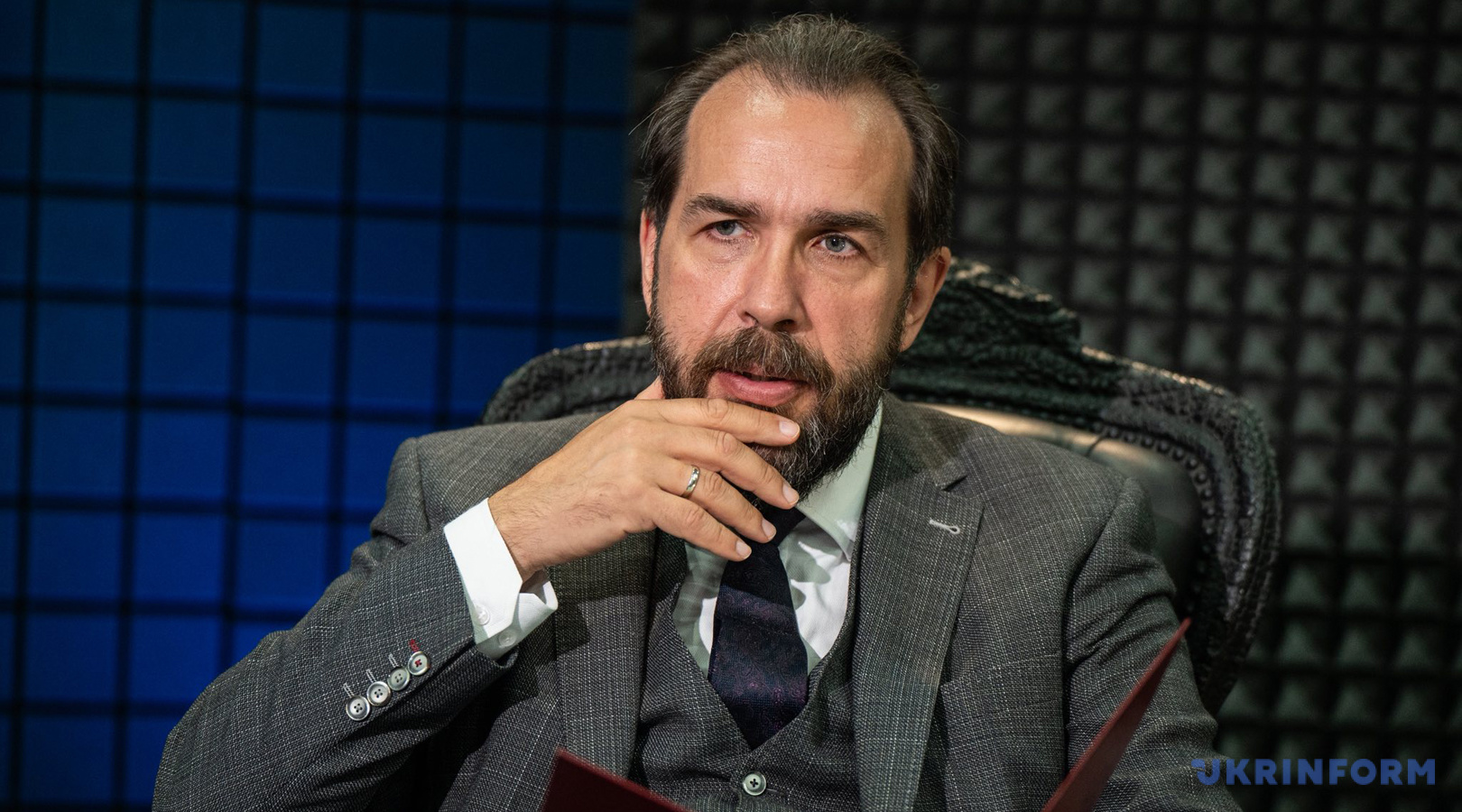
CONSTANT DIPLOMATIC EFFORTS ARE KEY TO OVERCOMING THE EU ACCESSION NEGOTIATIONS BLOCKADE
– Polish presidency of the EU is now coming to an end. How would you summarize it overall? I mean, from the Ukrainian perspective, unfortunately, the main thing was not achieved for us. We did not open the first membership negotiation clusters. Is there a chance to do this in the near future, during the Danish presidency in the second half of this year?
– Well, last chance for it was last week when, actually, Hungary blocked the opening of the first chapter, the so-called fundamentals. So, from the perspective of the public, it’s obviously a major disappointment, this position of Hungary, and also for us it’s a major disillusionment and, again, disappointment. I believe, still, for Ukraine, the Polish presidency of the European Union was also kind of a story of success. We adopted the 17th package of Russia sanctions against individuals and companies that are involved in supporting these heinous atrocities of the war. We were working towards the end of the presidency to prepare the next, 18th package that will be hopefully adopted quite soon.
We were also working toward the main goal of our presidency, which is security for Europe. This was achieved in the form of creating funds for the defense industry in Europe. Programs such as SAFE and ReArm Europe were created and adopted under our presidency, our organizational role. You should remember that the presidency nowadays is more about an organizational role rather than a leading one. But still, we are quite proud that we were able to support and speed up the process of adopting these defense industry funds, which by the way Ukraine will be able to use to the benefit of its soldiers on the frontline, producing defense tools. So we are quite happy with that. We treat it as a as a success.
There are many programs involving things a little bit further from Ukraine, like energy programs like Repower Europe also adopted during our presidency. Also, it’s the so-called Eastern Shield in Poland, a line of defense for the European Union against a possible Russian invasion. So, there are many issues that were actually stories of success of this presidency.
And what we learned during the presidency is that a constant diplomatic push is needed to overcome the blockade from certain member states, and I believe that will also we witness some successes to this end. Other member states previously were kind of distanced from the importance of the war in the center of Europe that Russia started, but we were able to convince them to support many, many programs within the European Union. So, it was a good diplomatic exercise, a good diplomatic effort on our part to actually strengthen Europe, to strengthen European Union, and to prepare a good basis for our successors, the Danish presidency, that will be able to utilize this diplomatic effort to the benefit of the European Union, and to the benefit of Ukraine, even as we have not opened the first cluster, we were able to organize, maybe, less formal talks and the working processes inside the Union that will speed up the process, and eventually the clusters will be opened, hopefully, during the next presidency, over the coming months, as they will utilize the effort of Polish diplomats in Brussels and member states’ efforts to facilitate the quicker opening of the clusters.
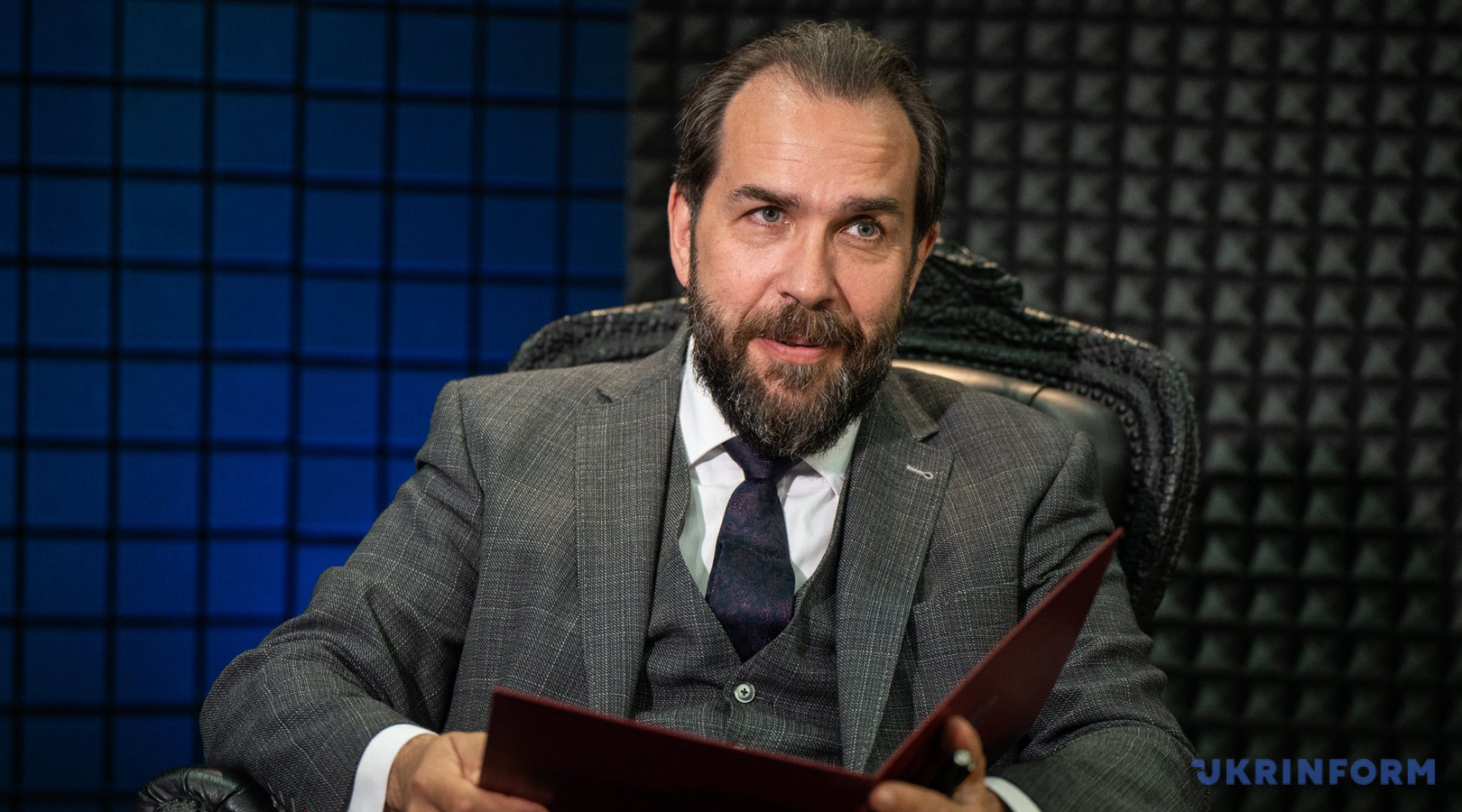
POLAND’S INTEREST LIES IN RUSSIA LOSING THE WAR
– Now another political question, for our audience to understand a little better the political landscape in Poland. As we heard during the election campaign, the new president-elect, Karol Nawrocki, was critical of the ideas of Ukraine’s NATO and EU membership. At the same time, the government and ruling coalition are pro. So, does it mean Warsaw will still speak in one voice on these issues or is there going to be confusion in this regard? How would you comment on this?
– It depends on what you mean by ‘one voice’? There are voices of a pre-campaign period, there are voices during the campaign, there’s a voice of the government, and there’s a voice of the current President Andrzej Duda, and I believe, see, and hear, that this is one voice, actually, that the government and the president express.
It’s not only a political position, but also kind of a national strategic Polish interest, that Russia has to be defeated in this war, that Ukraine has to remain free, democratic, independent, and sovereign country – possibly within the fullest of its territory, the territory that is internationally recognized. So that’s not a political voice. That’s a strategic voice of Poland. It is still the same, it remains the expression of not only Ukrainian interest, but our own interest. If you, Ukraine, were to lose the war or lose its sovereignty, that would mean immediate and very immense, dramatic threat to our own security.
So I don’t think that there is anyone who will challenge that importance of Ukraine remaining victorious, remaining, as I said, free, independent, and democratic.
I can only quote President Duda as he spoke during his visit: the position changes when you actually sit at the presidential desk and you look at the whole strategic situation of Poland, and I strongly believe that it will be also the situation here in Poland when the new president-elect assumes his duties in early August.
NO FORCE CAN STOP UKRAINE’S FUTURE MEMBERSHIP IN THE EU AND NATO
– So, how would you in short describe a model of Ukrainian-Polish strategic partnership? Is there a term to define it in one or two paragraphs?
– Our security is indivisible. Again, victorious, free, and independent Ukraine means security, it means safety, it means stability for Poland, and in the broader sense, for Central Europe and even for the whole Europe. So that’s the base of our understanding of the situation. This was the base when Poland jumped to defense of Ukraine in the beginning of the full-scale invasion. That was our strategic understanding that Kyiv must not fall. Kharkiv must not fall. Odesa must not fall, they must not be captured by Russia.
And that’s why, from the very, very first hours and days we were sending tanks, we were sending armored vehicles, we were sending Krabs, our famous artillery systems, which proved so effective on the frontlines.
We had this idea in our heads and in our hearts that Kyiv must not fall. And it’s still there. The work continues – unfortunately after more than three years. Although we are maybe not on the level of the equipment transfer volumes that we had in the beginning, there are still many facets of Polish military assistance to Ukraine, maybe less “heavy” in terms of tanks and artillery, but nonetheless it’s still very much important.
Communications, intelligence, trainings, financial and military assistance is ongoing. There are more than 30,000 Ukrainian soldiers that were trained in the last few years on Polish soil. We are, of course, maintaining and securing the hub in Rzesow, which is the main gateway for military assistance that is flowing into Ukraine through Poland.
It has to be said very strongly that we are very much the proponents, advocates of Ukraine being a part of the European Union. As we discussed before, we also maintain our position that this is important for NATO to maintain the open-door policy, that Ukraine is on its path to the future membership in NATO, because it’s only Ukraine, Ukraine authorities, and Ukrainian people that choose their own fate, choose their policies and strategies. No one should be able to prevent that.
As it was the desire of Poles in the 1990s to join NATO and European Union, right now it’s a desire and strong political will of Ukrainians to join European Union and NATO. And I don’t see any force to prevent that future membership. So, in a sense, Polish position has not changed in these strategic dimensions.
AVOIDANCE OF SHARP STATEMENTS ON HISTORICAL ISSUES, FOCUS ON EXHUMATIONS INSTEAD
– One of the very important aspects of our bilateral relations is the issue of history, definitely. I remember in our previous interview, you referred to Christian values and how important it is to respect, first of all, the families of the dead, and you expressed hope for the resolution of the issues around the permits for exhumation. How would you assess the current progress in exhumation works and new permits? Do you think Ukraine is showing willingness to address those historical dilemmas amid the ongoing war?
– It’s interesting that you recalled our first interview in October when I was talking about my hopes for how to settle this issue, how to open the conversation, and how to navigate this very delicate and troubling issue. We mentioned Christian values and civilizational heritage, that we both share that, how families should be able to bury to bury the remains of their relatives. And then, a few months later, as we are speaking in June, I’m happy to report that what we said a few months ago, materialized over the last few months. We started the exhumations in one of the villages, not formally existing anymore, Pyzhnyky, in Ternopil region. We are also preparing more exhumations in Lviv region.
By the way, we are opening ways and formalizing the exhumations in Poland where the remains of the Ukrainian people are found. They also have to be exhumed and properly buried.
So the administrative process is completely open. The talks between our experts, historians, and politicians that are part of the so-called Polish-Ukrainian working group are very open. I’m very optimistic that the process will continue.
Also, we were able to stay out of the political atmosphere that is surrounding this issue. There were no dramatic announcements, dramatic opinions, none of those dramatic findings, but rather official bureaucratic process that is actually a base for how the whole issue should be addressed.
Let’s deal with the remains. That’s the position that Ukraine and Poland share. Let’s deal with the remains. Let’s deal with the exhumations. And, of course, let’s maintain historic discussion. From time to time, there are news that bothers Ukrainians. Sometimes, something bothers Poles in this discussion but it’s normal given our common history, so to say. But again, it’s very important that bureaucratic process, as I call it, continues and will continue because there is great sympathy on both sides to actually to achieve more breakthroughs as we achieved already in Puzhnyky and other places.
THE “NEW NORMAL” COULD SHIFT PUBLIC OPINION
– Speaking of public opinions, we have been observing not only in Poland, but across Europe, that, to a certain extent, public support for the very idea of backing Ukraine in this war, helping us financially, militarily, as well as supporting us on the path to NATO and the EU, is waning, but it’s a steady trend. So here’s a two-parter. What is the main reason behind this trend, and how can we, together, mitigate it to try to reverse things?
– In a sense, I’m sorry to give a blunt answer that is not as much exciting as you would expect. Life normalizes even the worst, most exciting and most dramatic events. The beginning of the war was a really dramatic and exciting event. Refugees were flowing into Poland, into Europe. There was this huge humanitarian effort – also, an exciting effort. People were putting all of their emotions, their hearts in it. We saw pictures of kids, women, the elderly, sick people who were being transported, who were seeking refuge in Poland. And the Polish response to that was dramatic and exciting. But three years on, I think it’s a normal thing that even most dramatic events are being normalized, becoming a part of life.
We could say many things about it but in the end, it’s just normal. It’s just life. It is what it is. There are dramatic events outside Ukraine around the world that are catching the attention of the public. I’m not to judge whether it’s good or bad, it’s just a fact of life.
What is important, and I believe it’s still there, is an understanding even in these normalized conditions in the great portion of the Polish society, the Polish public, overwhelmingly in the Polish political elites, as I said in the beginning, Ukraine needs to has to remain democratic, independent, not under occupation, not under brutal authority of the Kremlin.
So you have you have public understanding, which maybe is less exciting, you have strategic decisions of many people in Poland in Europe in the broader sense that Ukraine needs to be supported. I’m not a sociologist at all, but you should look at the details of such polls. By the way, they are conducted also in Ukraine. Here there’s almost the same number of people who want the end of the war and who want a big Ukrainian Victory. So sometimes, it’s a little bit difficult, when you ask people in the street, to hear something meaningful. People base their answers on their very recent emotions, maybe events from their lives, while questions apply to strategic things.
And that’s why I’m not in favor of discussing the insights from such polls because they might be misleading, and sometimes the answers might even contradict each other, That’s my general feeling about the issues you are raising. Again, I very strongly stressed, and I repeat it, that people in Poland, Lithuania, Estonia, Latvia, Czechia, Slovakia have a very bad memory of Russian occupation. Russia, the Kremlin looms large over our history of the last three to four hundred years. The emotion that is connected with that is really bad in our national psyche.
This still exists, and the images from Ukraine, stories from Ukraine actually strengthen this image, and there’s no Polish citizen, not a single Pole who would say that Russian occupations is good. So sometimes a question is so deep, so complicated that, if you want to base your answer on just a question from public opinion polls as it might be very misleading.
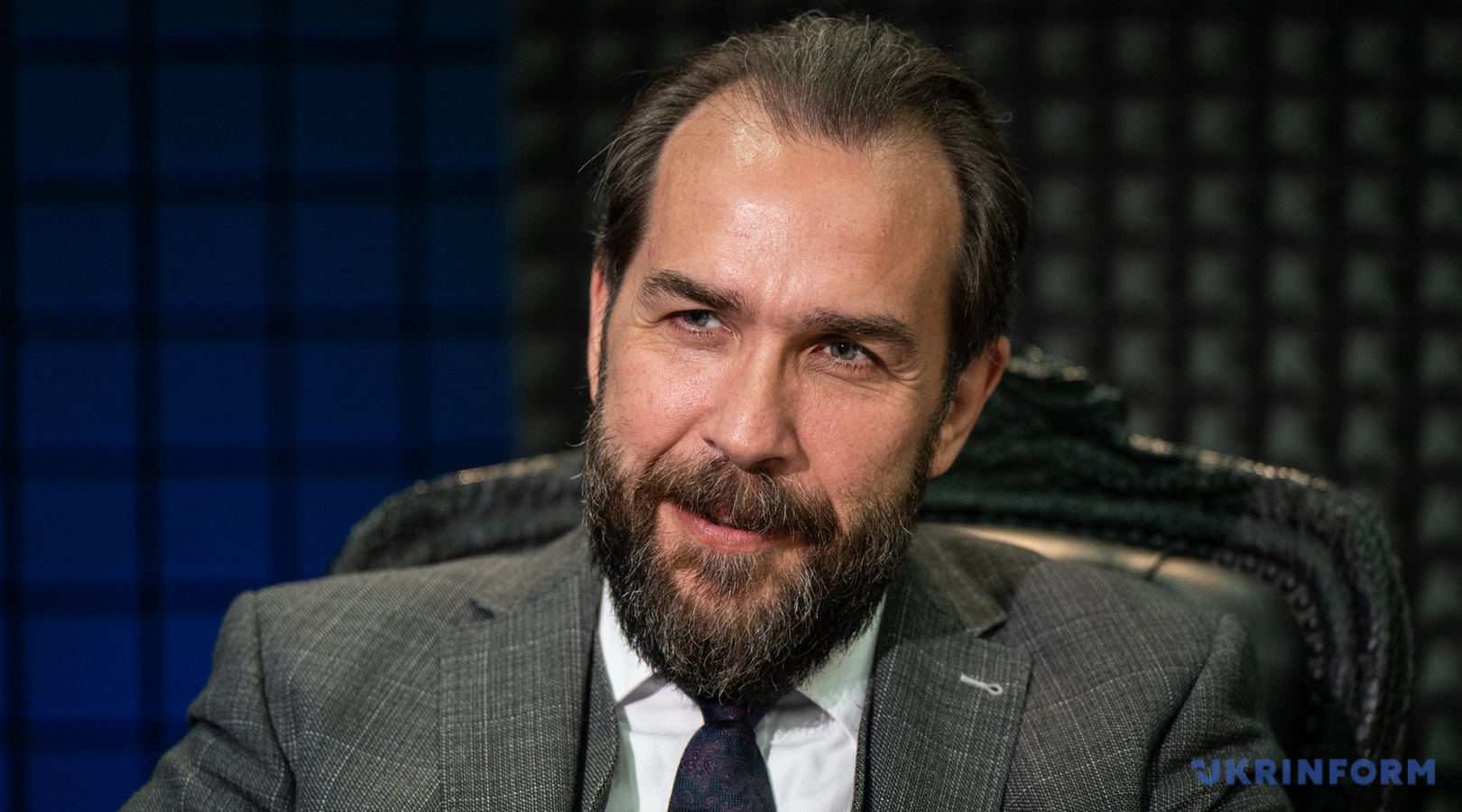
POLES AND UKRAINIANS HAVE A NATURAL REFLEX TO RESIST INFLUENCE OPERATIONS
– We should not, and we do not, underestimate Russia in terms of their ability to manipulate public opinions, of course, and I do realize that they understand: if Poland and Ukraine stand together, if the peoples of Poland and Ukraine stand together, it’ll be really hard to fight this joint might. How is the situation now in Poland, where you’re probably in touch with your colleagues, with Russian attempts to pit us against each other, to create provocations? Is there any coordination ongoing between authorities dealing with the information space security in Poland and Ukraine in order to identify, fight, and also deter these attempts?
– That’s a very good question connected with the previous one regarding public opinion in Poland, and how Russia could influence that. And I have a fantastic example of what the response could be like by both Poland and Ukraine. So, after the Puzhnyky exhumations, one of the websites posted a short video showing a person looking like one of the archaeologists working in Puzhnyky, Professor Osowski, speaking in a very clear way, that Ukraine blocked exhumations. That was a shocking video because I actually know the person. That image was very natural, looking very real, the voice was the same. Of course, this was an AI fake, a typical one.
Immediate reaction of not only Polish and Ukrainian ministries of culture, which are responsible for this process, but also influential Polish politicians and Ukrainian politicians, public figures, YouTubers was immediately to reject this Russian fake. In just a few hours, maybe even without some major coordination between us, it was completely rejected. It was exposed as very malicious influence stunt, a work of the Kremlin. So we might not even need some major formal cooperation in this regard because this is in us to be suspicious of everything that seeks to sow division between Poland and Ukraine. This is kind of a natural reflex of Poles and Ukrainians to reject this kind of influence operations.
Based on that example and few others as well, I’m still optimistic that we cannot be divided, that we understand that we both, Ukrainians and Poles – and others in Central Europe – how important it is to stand together, to stick together, to defend militarily, in the informational space, and so on. I don’t see a chance that we will be divided to the level that it would actually influence our strategies, our main policies.
UKRAINIAN REFUGEES ARE AN IMPORTANT AND VALUED PART OF POLISH SOCIETY
– One of the factors that contributes largely to keeping awareness high in Poland about the things that are going on in Ukraine is the massive number of Ukrainians living in Poland. Your country has become a humanitarian hub for those who were fleeing the war, especially at it’s very outset. It welcomed so many Ukrainian families, mostly women and children. Just recently, our ambassador noted that they are actually integrating rather well, contributing to Polish economy. But still, the question is, are there any plans to change social protection status, especially as regards the most vulnerable ones?
– First, thank you very much for giving me this space to say that. By the way, I should also be speaking to the Polish media about it, maybe more. Between 2008 and 2019, some 13 percent of Polish GDP was generated by Ukrainians living there, before the full-scale invasion, as members of our communities, business people, people working there, and so on. It was an economic impact that the Ukrainian minority made in Poland. Since the full-scale invasion in 2022, the 2.7 percent of GDP growth could be ascribed to Ukrainians, Ukrainian refugees. 80 percent of them have normal work, they pay taxes. So this is solid economic data that supports the thesis that Ukrainians are part of our society, a very valuable and very important part, and they should be treated as such. Also, as the members of our society that are privileged to have a normal social security network. It’s allowances that are applicable to other people living in Poland, to Poles in the general sense.
As far as I know, and I believe we talked about it before as well, in every normal country, social policies are subject to tweaking to normalizing, to becoming more efficient, but in a sense that it’s not a dramatic change, and I don’t think that will be any dramatic change, particularly for Ukrainians living in Poland.
They are still being treated as refugees that needed support, especially as you said the vulnerable ones and they are still allowed to social services that are offered to Polish citizens. So I’m sure that there are no dramatic changes on the horizon, except for some minor changes, which are kind of normal in social policies in any EU country.
FOR POLAND, THE MILITARY CONFLICT IS ALREADY A FORESEEN FUTURE
– I had to ask that because our viewers living in Poland would likely want to know if there’s anything on the horizon. Coming back to the to Polish assistance, the immense assistance Poland is providing to Ukraine, I would also want to talk about cooperation, especially in the defense industry. Can you comment on anything particular that you see as most promising area for such cooperation? Maybe you have some success stories to share?
– Well, most part of our military cooperation is probably classified but let me tell you this. I think Ukraine is not a taker. It’s not only taking military, humanitarian, political, financial assistance, and so on. It’s also a giver. It can also be a source of innovation, technologies, military sciences, scientific developments, doctrines, and so on. So when you treat Ukraine as a giver of these things and values, I mentioned, all kinds of cooperation is possible.
I can share the details that we have very good research cooperation between the relevant military institutions that are dealing with our own and trophy equipment, captured Russian equipment. This is something that we are actually doing, and I’m very happy about that, because very important parts of brilliant Ukrainian technology is based on cooperation between Polish engineers and their Ukrainian colleagues, working together to develop new ways of hitting Russians. So that’s very good.
We are still working on something major, a strategic cooperation project on particular types of equipment that would really not only be useful during this war, but could be seen as a kind of anchors that connect Ukraine to Poland, Poland to Ukraine, but in a broader sense – Ukraine to the European Union. I cannot go into details right now, but there are such ways to cooperate in a bigger sense. That’s because our ambitions are great, your ambitions are obvious. Polish ambitions of being an important military actor in this part of the world are also obvious. And we are working hard to achieve that, to do it in partnership because it’s very effective, it’s cheaper, and it’s based on the actual war experience.
A warlike situation for us, for Central Europe, is a predictable future for us, so we must not lose the opportunity to prepare for warlike scenarios in the future, because the Ukrainian example teaches us that everything is possible. Everything bad is possible from Russia.
So we are still delivering normal packages, such as ammunition, armaments, all kinds of equipment, maybe not on the same scale. Poland is still the leader in delivering tanks for Ukraine. More than 300 tanks have been delivered by Poland alone. So you see that the whole picture is very bright when it comes to our defense industry relations. But again, we do not rest. I believe that joint production of various heavy stuff is possible and ahead of us.
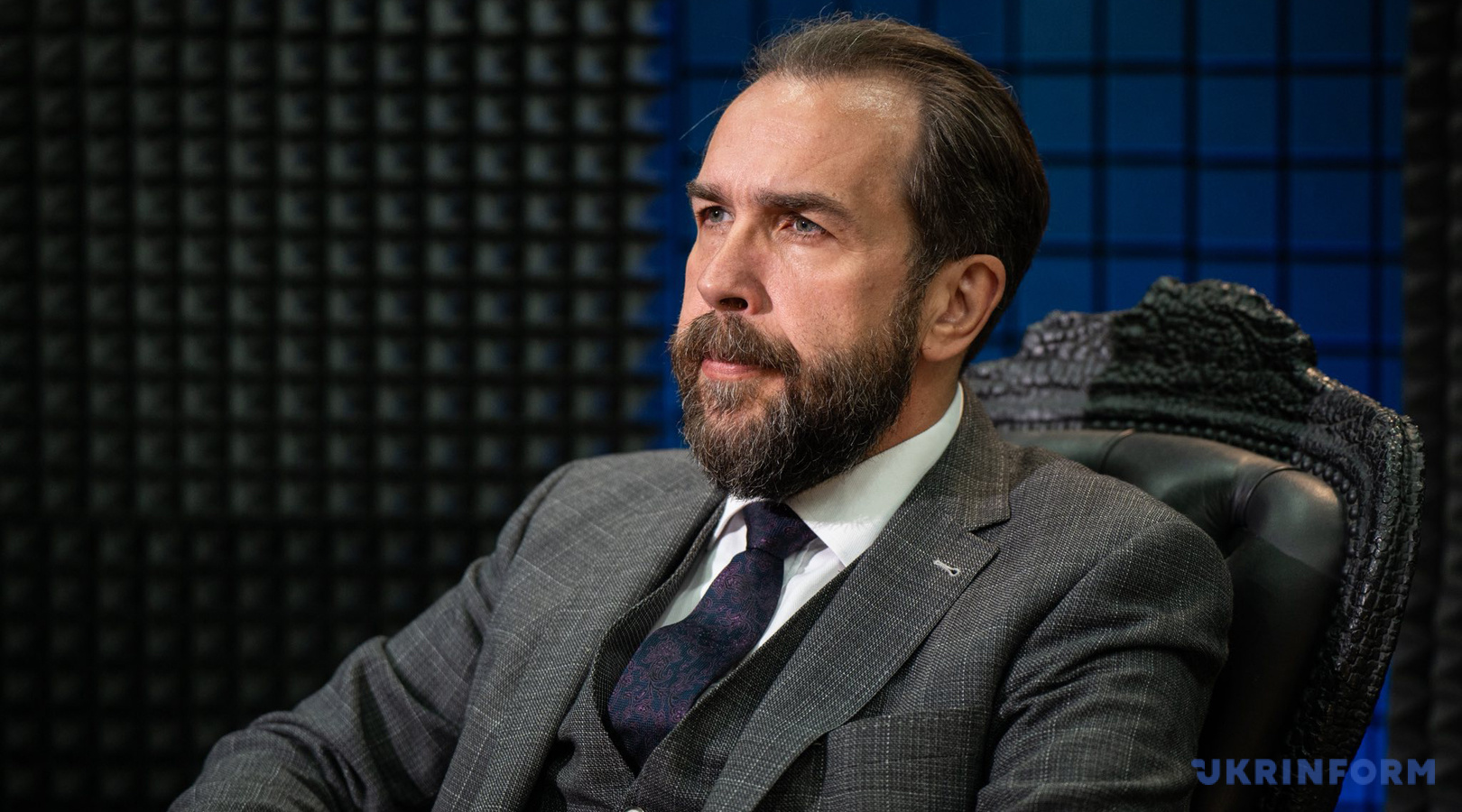
POLAND IS CREATING AN ENVIRONMENT FOR UKRAINE’S RECONSTRUCTION
– Speaking of cooperation in a broader way, economic operation, there is potential for significant growth. There might be new supply chains, infrastructure projects, of course, post-war recovery, and reconstruction that’s already ongoing, even amid war. What’s the Polish side’s vision on the new economic initiatives and projects, including in the border regions?
– On the one hand, it’s simple because our geographical position gives us exclusive ways to cooperate with Ukraine. On the other side, it’s much more complicated. Not harder, but kind of more complicated in a sense that there are more than 3,000 Polish companies present on the Ukrainian market from before the war, and even currently. There are the efforts of reconstruction that has not started yet because the war is ongoing, the actual construction will actually start after the possible ceasefire. We are preparing in a very broad sense. We are creating a reconstruction environment and tools that would be very much useful for Ukraine and for Poland in the nearest future.
We are opening Bank Gospodarstwa Krajowego, which is the Polish National Development Bank. We have two Polish insurers for foreign investment, present in Ukraine, one private and one state-owned, the State Insurance Corporation (KUKE). We have private banks that had already been present before the war. We have a major development agency, a semi-state-owned fund, called Solidarity Fund, working on various projects mostly connected with helping Ukrainian veterans, which by the way is a crucial topic for me personally, for our Embassy, and for Polish assistance to Ukraine.
So we have these tools in place. I’m not even talking about number of companies but there are at least three associations of companies present in Ukraine. They are working on connecting Ukrainian and Polish businesses.
Of course, the agriculture stories are a little bit complicated, as you know, with Ukraine being a future member of European Union and also a challenger of the current agricultural architecture, including in Poland. But I hope we will manage that too. With our capabilities of processing agricultural goods and resources, combining it with Ukrainian capabilities of producing resources, there is great potential for cooperation in that. So there will be many opportunities.
There are few challenges ahead of us in terms of economic cooperation, but the reconstruction of Ukraine, while being conducted in Ukraine, will be based in Poland, and that’s what makes us so close and so important for each other.
THE WAR TEACHES US THAT THE ARCHITECTURE OF INTERNATIONAL ALLIANCES CAN CHANGE RAPIDLY
– An interesting thing you said that Poland, and also the whole Eastern flag, are pretty much bracing for a potential contingency in the region. Does Poland explore the ideas of developing some multilateral alliances, maybe trilateral formats like the Lublin Triangle formats, which would include security components, and which would also include Ukraine to better protect and potentially defend the region, not only about deter but fight, too? Is there any idea any format of this kind should be developed or created?
– This war teaches us that the architecture of formats might change very rapidly. Look, for instance, at the Visegrad format, or V4, that we are still trying to keep it afloat. But of course, the position of at least one country in this format is not very much oriented towards cooperation when it comes to security issues, when it comes to Ukraine.
So we see the diminishing of the positions of one format, but the explosion of different formats that reflect the new thinking of the security of Europe. There is the Scandinavian format, the Baltic format. Actually, the most important one is the restoration of the Weimar Triangle, sometimes called Weimar Triangle Plus, meaning Poland, France, Germany, plus UK, plus Italy, major actors in terms of military potential.
You see other names, sometimes funny, like the Big Five. Prime ministers, heads of states met in The Hague, just recently with prime minister Tusk attending that meeting, and a few weeks ago in Kyiv. That means that Poland is at the center of creating something new. Maybe it’s not a new architecture of security in Europe because we have still NATO, which is the basis of security and architecture. But we’re trying to create and participate in the formats of cooperation that are designed to better protect us and also help Ukraine to become a part of it, future part of it, future part of European Union, future part of NATO as well.
DUDA’S FAREWELL VISIT WAS VERY EMOTIONAL
– To wrap up this interview, I’d like to ask a question to you as a former journalist, a former military and now a diplomat. How would you assess the latest visit of your president to Ukraine? It was like a landmark visit, at farewell visit, but how did you see the coverage of that visit in Poland, and how did you see it from Ukraine as the one welcoming your president here?
– I would not dare to talk about the general reception. I can only speak of my personal one. I can sum up this visit with the word “moving”, a very moving one a very emotional one. It was indeed a farewell visit of President Andrzej Duda. I’d especially note the ceremony where families and soldiers were awarded and where President Duda received the Medal of Freedom from President Zelensky in the Sophia Square. That was actually a very moving one. Our president was moved. He was very emotional about the fact that he received the medal right after the Ukrainian soldiers, but also right after families of fallen heroes. Especially that mother and child. Remember the picture of the widow of the Fallen Soldier with her kid coming to president Zelensky.
I was standing in the group of ambassadors, and our delegation was there. President was at the podium, and the and the diplomats were standing in the line. A lot of us had tears in our lives. And then president Duda received the Order of Freedom, the highest Ukrainian medal given to foreign citizens. It was a very moving ceremony. And President Duda responded in a very nice way – that it’s not only he who received that medal, it’s actually the Polish nation that helped Ukraine so much, opened their hearts in 2022, and they really deserve this highest appreciation from Ukraine. That was something that I will definitely remember from this visit.
Ievgen Matiushenko, Kyiv
Photo credit: Dmytro Antoniuk
Source: Piotr Lukasiewicz, Charge d’Affairs a.i. of Poland in Ukraine

